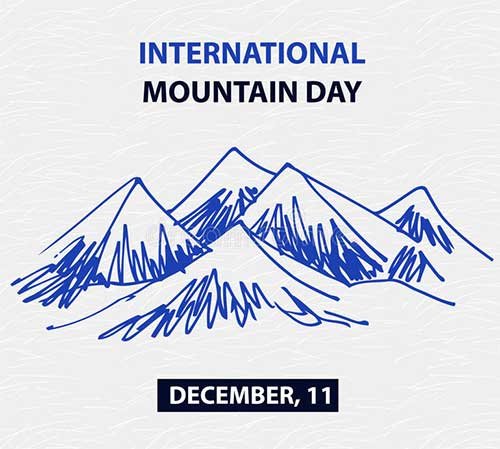
International Mountain Day is celebrated annually on December 11 to recognize the importance of mountains to the world’s ecological health, cultural heritage, and economic sustainability. This global observance, designated by the United Nations in 2003, is an opportunity to raise awareness about the challenges facing mountain regions and the people who call them home. It also highlights mountains' critical role in providing freshwater, conserving biodiversity, and mitigating climate change.
Mountains cover approximately 27 per cent of the Earth’s land surface and are home to nearly 15 per cent of the world’s population. They serve as the planet's water towers, supplying more than half of the global population with freshwater for domestic, agricultural, and industrial purposes. Moreover, mountains are rich in natural resources, including forests, minerals, and diverse flora and fauna, making them vital to the health of the Earth and its inhabitants.
The Significance of International Mountain Day
Mountains are not just majestic landscapes but lifelines for millions of people. The observance of International Mountain Day underscores the urgency of protecting these vital ecosystems and fostering sustainable development in mountain regions. Over the years, this day has brought attention to various issues, including poverty, food insecurity, deforestation, and the impacts of climate change on mountainous areas.
International Mountain Day adopts a specific theme each year to spotlight a particular aspect of mountain sustainability. Themes such as "Sustainable Mountain Tourism," "Mountains Matter for Youth," and "Mountain Biodiversity" have encouraged global conversations and actions to preserve these natural wonders.
Mountains as Cradles of Biodiversity
Mountains are biodiversity hotspots that house unique ecosystems and species found nowhere else on Earth. The steep gradients, varying altitudes, and climate conditions create microhabitats that support a wide range of life forms. This biodiversity contributes to ecosystem services like pollination, water purification, and climate regulation, which are essential for the survival of all living beings.
However, mountain biodiversity is under threat from human activities such as deforestation, mining, and unsustainable agriculture. Climate change exacerbates these challenges, as rising temperatures and shifting weather patterns disrupt fragile ecosystems. Protecting mountain biodiversity is crucial not only for the species that inhabit these regions but also for the planet's ecological balance.
The Role of Mountains in Water Security
Mountains play a crucial role in the global water cycle, acting as natural reservoirs that store and release freshwater. Snow-capped peaks and glaciers are vital water sources for rivers, streams, and lakes, providing essential resources for agriculture, drinking water, and hydropower. Some of the world’s major rivers, including the Ganges, Mekong, and Nile, originate in mountain regions.
As climate change accelerates, the melting of glaciers and reduced snow cover threaten the water supply for millions of people. This has far-reaching implications for food security, energy production, and the livelihoods of those who depend on mountain ecosystems. Efforts to preserve and restore mountain watersheds are critical for maintaining global water security.
Cultural and Spiritual Importance of Mountains
Beyond their ecological significance, mountains have profound cultural and spiritual value. Many cultures regard them as sacred sites, symbolizing strength, resilience, and a connection to the divine. From the Andes to the Himalayas, mountains inspire art, literature, and traditions that enrich human heritage.
Mountain communities, often isolated from urban centres, have developed unique ways of life that reflect a deep respect for nature. These indigenous practices and knowledge systems hold valuable lessons for sustainable living and environmental conservation.
Challenges Faced by Mountain Communities
Despite their rich cultural heritage and ecological significance, mountain communities are among the world's most marginalized and vulnerable populations. They face numerous challenges, including:
• Poverty: Limited access to education, healthcare, and economic opportunities often leaves mountain communities impoverished.
• Climate Change: Rising temperatures and extreme weather events disproportionately affect mountain dwellers, disrupting their livelihoods and food security.
• Infrastructure Gaps: The remoteness of mountain regions often results in poor infrastructure, including roads, schools, and medical facilities.
• Loss of Traditional Knowledge: Modernization and migration erode traditional knowledge and practices that have sustained mountain ecosystems for generations.
Addressing these challenges requires targeted policies and investments that prioritize the needs of mountain communities while preserving their cultural and natural heritage.
Sustainable Development in Mountain Regions
Sustainable development is the cornerstone of efforts to address the challenges faced by mountain regions. This involves balancing mountain communities' economic, social, and environmental needs to ensure a prosperous future. Key strategies include:
• Promoting Eco-Tourism: Sustainable tourism can provide economic opportunities while preserving mountains' natural beauty and cultural heritage.
• Supporting Agriculture: Encouraging climate-resilient farming practices and providing market access can improve food security and livelihoods.
• Conserving Ecosystems: Protecting forests, wetlands, and other critical habitats in mountain regions is essential for biodiversity and climate regulation.
• Investing in Renewable Energy: Harnessing the potential of hydropower, wind, and solar energy can reduce dependence on fossil fuels and support sustainable development.
Global Collaboration for Mountain Conservation
The preservation of mountain ecosystems and the well-being of their communities require global cooperation. International Mountain Day is a platform for governments, organizations, and individuals to unite and take meaningful action. Initiatives such as the Mountain Partnership, a UN-led alliance, work to promote sustainable mountain development and address the unique challenges of these regions.
Efforts to conserve mountains are about protecting nature and ensuring humanity's survival. The interconnectedness of ecosystems means that the health of mountains affects the well-being of people far beyond their borders.
A Shared Responsibility
As we celebrate International Mountain Day, it is essential to recognize that everyone has a responsibility to preserve mountains. Governments must enact and enforce policies that prioritize mountain conservation. Businesses should adopt sustainable practices that minimize their environmental impact. Individuals can contribute by reducing waste, supporting eco-friendly tourism, and raising awareness about the importance of mountains.
International Human Rights Day A Global Commitment to Equality and Freedom reminds us of the shared values that underpin global cooperation. Just as human rights are universal, the health of our planet, including its mountains, is a collective responsibility. Protecting mountains is not only an environmental imperative but also a moral one, ensuring that future generations inherit a world where they can thrive.
Conclusion
International Mountain Day is a call to action for individuals, communities, and nations to recognize the value of mountains and the urgent need to protect them. These towering landscapes, with their rich biodiversity, cultural significance, and critical role in sustaining life, deserve our utmost care and respect. We can create a more sustainable and equitable future for all by working together to address the challenges facing mountain regions.
As we reflect on the beauty and importance of mountains, let us commit to safeguarding them. Their preservation is a testament to our respect for nature and a step toward a healthier, more resilient planet.
#InternationalMountainDay #Mountains #UnitedNations





